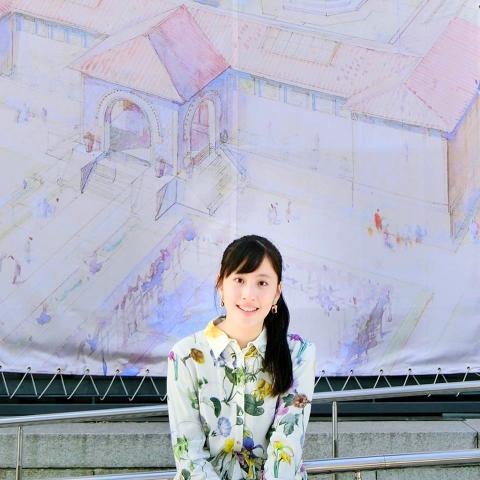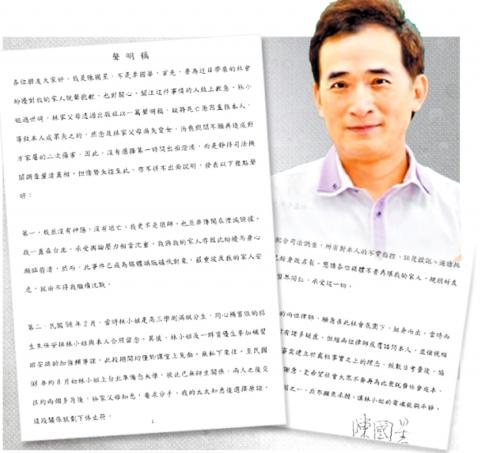Cram-school teacher Chen Kuo-hsing (陳國星) on Tuesday broke his silence following accusations that he sexually assaulted a former student Lin Yi-han (林奕含), who committed suicide late last month.
Chen said in a statement that he is not Lee Kuo-hua (李國華), a character in Lin’s novel published in February last year.
The character, Lee, is a cram-school teacher who rapes and sexually abuses several of his female students.

Photo: Wang Chieh, Taipei Times
In an interview, Lin said that the character was “based on someone she knew in real life.”
Her parents said after her death that the female student characters in the novel were Lin’s alter egos and that the events depicted in the novel were true.
Chen said that he and Lin began dating in August 2009 when Lin was no longer his student and had started college.

Photo: copied by Wang Chun-chung, Taipei Times
He said that before August 2009, when Lin was enrolled in his class, the two had never met in private.
Chen rejected allegations that he had “coaxed Lin into having sex,” adding that he was only guilty of having an extramarital affair.
After the affair came to light, Lin’s parents demanded that the two stop seeing each other, Chen said, adding that his wife chose to forgive his infidelity.
He denied that he had deliberately hidden from the public, saying that he did not want to cause Lin’s family more pain while they arranged her funeral.
He also denied that Lin had depression because of him, saying that she had suffered from depression since she was 16 years old, before the two had met.
“In hindsight, Ms Lin had often felt unhappy due to exam-related stress and the distance between her learning and her passion,” Chen said.
“Lin’s novel was not autobiographical. Lin said at a news conference to promote the book that she was not Fang Ssu-chi (房思琪) [the protagonist in the novel],” he said. “Lin’s novel is a work of fiction throughout which space-time juxtapositions are created.”
Chen said that he would cooperate with investigations into accusations of sexual assault.
He said that he and his family had been on the brink of an emotional breakdown after the groundless accusations against him made the headlines, pleading with society not to continue hurting his friends and family.
Taiwan Gender Equity Education Association chairwoman Chuang Shu-ching (莊淑靜) said that students are traditionally expected to be obedient to their teachers and that Lin likely developed an admiration for Chen, which could have led to an affair.
Parents are often concerned that sex education will tempt their children to have intercourse, but this incident shows the dangers children face cannot be prevented by discarding sex education, Chang said.
It also shows that children that have become alienated from their parents are at a greater risk of sexual abuse, she said.
Humanist Education Foundation executive director Joanna Feng (馮喬蘭) criticized Chen for allegedly dating Lin, saying that Lin was a minor whose mind likely had not fully developed.
Chen has no right to unilaterally interpret what happened between himself and Lin, Feng said.

CHAOS: Iranians took to the streets playing celebratory music after reports of Khamenei’s death on Saturday, while mourners also gathered in Tehran yesterday Iranian Supreme Leader Ayatollah Ali Khamenei was killed in a major attack on Iran launched by Israel and the US, throwing the future of the Islamic republic into doubt and raising the risk of regional instability. Iranian state television and the state-run IRNA news agency announced the 86-year-old’s death early yesterday. US President Donald Trump said it gave Iranians their “greatest chance” to “take back” their country. The announcements came after a joint US and Israeli aerial bombardment that targeted Iranian military and governmental sites. Trump said the “heavy and pinpoint bombing” would continue through the week or as long

TRUST: The KMT said it respected the US’ timing and considerations, and hoped it would continue to honor its commitments to helping Taiwan bolster its defenses and deterrence US President Donald Trump is delaying a multibillion-dollar arms sale to Taiwan to ensure his visit to Beijing is successful, a New York Times report said. The weapons sales package has stalled in the US Department of State, the report said, citing US officials it did not identify. The White House has told agencies not to push forward ahead of Trump’s meeting with Chinese President Xi Jinping (習近平), it said. The two last month held a phone call to discuss trade and geopolitical flashpoints ahead of the summit. Xi raised the Taiwan issue and urged the US to handle arms sales to

BIG SPENDERS: Foreign investors bought the most Taiwan equities since 2005, signaling confidence that an AI boom would continue to benefit chipmakers Taiwan Semiconductor Manufacturing Co’s (TSMC, 台積電) market capitalization swelled to US$2 trillion for the first time following a 4.25 percent rally in its American depositary receipts (ADR) overnight, putting the world’s biggest contract chipmaker sixth on the list of the world’s biggest companies by market capitalization, just behind Amazon.com Inc. The site CompaniesMarketcap.com ranked TSMC ahead of Saudi Aramco and Meta Platforms Inc. The Taiwanese company’s ADRs on Tuesday surged to US$385.75 on the New York Stock Exchange, as strong demand for artificial intelligence (AI) applications led to chip supply constraints and boost revenue growth to record-breaking levels. Each TSMC ADR represents

State-run CPC Corp, Taiwan (CPC, 台灣中油) yesterday said that it had confirmed on Saturday night with its liquefied natural gas (LNG) and crude oil suppliers that shipments are proceeding as scheduled and that domestic supplies remain unaffected. The CPC yesterday announced the gasoline and diesel prices will rise by NT$0.2 and NT$0.4 per liter, respectively, starting Monday, citing Middle East tensions and blizzards in the eastern United States. CPC also iterated it has been reducing the proportion of crude oil imports from the Middle East and diversifying its supply sources in the past few years in response to geopolitical risks, expanding